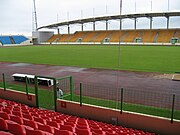| Revision as of 23:30, 21 June 2011 edit41.235.37.228 (talk)No edit summary← Previous edit | Revision as of 04:15, 22 June 2011 edit undoΔ (talk | contribs)Autopatrolled, Extended confirmed users, Pending changes reviewers35,263 edits All non-free files used on this page must have valid and specific rationale for use on this page; please see Misplaced Pages:Non-free use rationale guideline for more information; one or more files removed due to missing rationaleNext edit → | ||
| Line 80: | Line 80: | ||
| |] | |] | ||
| |- | |- | ||
| | | |||
| |] | |||
| | | | | ||
| |] | |] | ||
Revision as of 04:15, 22 June 2011
| Coupe d'Afrique des nations de football 2012 Copa Africana de Naciones 2012 AFCON 2012 CAN 2012 | |
|---|---|
 | |
| Tournament details | |
| Host countries | Gabon Equatorial Guinea |
| Dates | January 21 – February 12 |
| Teams | 16 (from 1 confederation) |
| Venue(s) | 4 (in 4 host cities) |
| ← | |
The 2012 Africa Cup of Nations will be the 28th edition of the Africa Cup of Nations, the football championship of Africa organized by the Confederation of African Football (CAF). It will be co-hosted by Gabon and Equatorial Guinea. The two countries won the right to host the tournament after defeating a Nigerian bid along with two other bid winning nations, Angola and Libya. Bids from Mozambique, Namibia, Zimbabwe and Senegal were rejected. For the first time in CAF history, the hosts of three successive tournaments were chosen at the same time; Angola was chosen to host in 2010, Gabon/Equatorial Guinea were chosen as hosts for the 2012 cup and Libya for the 2013 edition. Nigeria was chosen as a stand-by host in the event that one of the chosen nations were to become unsuitable.
Bids shortlist
Five countries were put on the shortlist to host the tournament including one joint bid.
 Angola
Angola Gabon /
Gabon /  Equatorial Guinea
Equatorial Guinea Libya
Libya Nigeria (reserve hosts)
Nigeria (reserve hosts)
Qualification
Main article: 2012 Africa Cup of Nations qualificationThe qualification process involves ten groups of four, one of which was reduced to a group of three after the withdrawal of Mauritania, and one group of five. The top team from each group goes through, as well as the second placed team from the group of five. The two best second place teams also qualify. At the end of the qualification process, fourteen teams will have qualified, as well as the two host nations. The first qualifiers were held on 1 July 2010.
Qualified teams

| Country | Qualified as | Date qualification was secured | Previous appearances in tournament |
|---|---|---|---|
| 00Hosts | 0329 July 2007 | 4 (1994, 1996, 2000, 2010) | |
| 01Hosts | 0029 July 2007 | 0 | |
| 01Group K Winner | 0026 March 2011 | 0 | |
| 01Group H Winner | 0005 June 2011 | 18 (1965, 1968, 1970, 1974, 1980, 1984, 1986, 1988, 1990, 1992, 1994, 1996, 1998, 2000, 2002, 2006, 2008, 2010) |
National team banishments
Togo
Togo were initially banned from the 2012 and 2013 Africa Cup of Nations tournaments by CAF after they withdrew from the 2010 tournament following a deadly attack on their team bus. Togo appealed to the Court of Arbitration for Sport, with FIFA president Sepp Blatter stepping in to mediate. The ban was subsequently lifted with immediate effect on 14 May 2010, after a meeting of the CAF Executive Committee. Togo are therefore free to play in the 2012 and 2013 tournaments.
Nigeria
On June 30th, after Nigeria's exit from the 2010 FIFA World Cup, Nigerian President Goodluck Jonathan punished the team for a poor campaign by imposing a 2-year ban from international competition. This would have resulted in the Nigerians missing out on both the 2012 qualifying phase and the 2012 African Cup of Nations. However, on July 5th, the Nigerian government dropped the ban after FIFA threatened to impose harsher international sanctions as a result of the government interference. Nigeria will now compete in qualifying for the 2012 Africa Cup of Nations as scheduled.
Venues
The opening match, one semi-final and the third place match will be held in Equatorial Guinea while the other semi-final and the final will be held in Gabon.
| Stade d'Angondjé | Stade de Franceville | Estadio de Bata | Nuevo Estadio de Malabo |

|

| ||
| Capacity: 45,000 | Capacity: 40,000 | Capacity: 40,000 | Capacity: 15,250 |
Squads
Draw
Group stage
The draw for the finals will take place in October, 2011 exact date to be determined later.
References
- "Angola to host 2010 Nations Cup". BBC Sport. 2006-09-04. Archived from the original on 2007-03-13. Retrieved 2006-09-27.
- "Full schedule of qualifiers matches for CAN 2012". 2010-02-15.
- "Togo officially disqualified from Africa Cup of Nations". BBC Sport. BBC. 11 January 2010. Retrieved 14 May 2010.
- "Togo's African Cup ban is lifted". BBC Sport. BBC. 14 May 2010. Retrieved 14 May 2010.
- "Nigeria's President Suspends Soccer Team". Wall Street Journal. Wall Street Journal. 30 June 2010. Retrieved 8 July 2010.
- "Nigeria backs down on soccer ban". ESPN. ESPN. 6 July 2010. Retrieved 8 July 2010.
- "Gabon : Libreville et Malabo s'accordent pour la CAN 2012". Gaboneco (in French). 2010-01-05. Retrieved 2010-01-13.
{{cite news}}: Unknown parameter|trans_title=ignored (|trans-title=suggested) (help) - http://www.starafrica.com/en/sport/can-orange-2012/article/afcon-orange-2012-equatorial-guinea-g-135701.html
- http://www.worldstadiums.com/stadium_pictures/africa/equatorial_guinea/malabo_estadio.shtml
- "CAF Executive Committee Decisions". cafonline.com. Confederation of African Football. 16 May 2011. Retrieved 29 May 2009.
| Africa Cup of Nations | |
|---|---|
| Editions |
|
| Qualification | |
| Finals | |
| Bids | |
| Squads | |
| Statistics | |
| Miscellaneous | |
| |